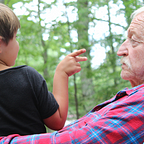1952: I turn thirteen
A Man Who Never Went to War
One is responsible to life: it is the small beacon in that terrifying darkness from which we come and to which we shall return.
-James Baldwin, The Fire Next Time
Most days of junior high I walked into school in the grip of the stifling hand, the nausea unrelenting. It would continue its work on me for many years to come.
Even so, some mornings, the sun taking it’s time to rise and coloring the sky, I would look for a return of a lifting feeling.
I’d felt it once the previous terrible summer, and I understood why hope is said to glimmer: One morning, toward the very end of the camp season, a few rays of glimmering sun fingered their way through the trees and fell upon my face. And then, from the bottom of the hill at end of the cove, for a short time I was released, raised up, free of the hand, held by other hands up and away — away from the knowledge of that other ultimate truth and its ministers, fear and sadness.
I knew it was possible. And so I prayed, “Dear God, give me just one day without this feeling and then I will be willing to die. Just one day, God, just one day.” I prayed this prayer at night, in the day. I wasn’t suicidal. I was asking for a trade. To be granted one full day free of the feeling, free of the hand, and then God could take me. “Just one day, God, just one day.”
Springtime Mom and I agreed that we would stay close during the camp season, sleeping in the Big House. My father said nothing. That summer at Camp Husky, each morning, the good old sun stood with me when I stood, but by mid-late afternoon as he readied to retire, the hand would move in and turn and squeeze life out of me.
Once or twice I tried playing softball up on the hill. The campers were good to me. They knew something was wrong, but never asked. I would go through the motions. Swing, run, swing, run home. Run home to mother.
That winter of 1952, other boys’ dads were in Korea, American soldiers taking bullets in the face and setting enemies on fire with flamethrowers. My dad was too old for war, but Coach was still fit enough to dominate the men’s church basketball league. In the weekly sports news he was called “Mister Basketball.”
I made an effort. I was beginning to feel better. Saturday evenings after basketball sometimes even felt celebratory. I could have a Pepsi and potato chips and watch television. I liked drinking the soda from a shot-glass that I’d found in the cellar. I was like the movie cowboys at the saloon. I wiped my mouth on my sleeve. We were a teetotaler family, but my parents didn’t mind.
One Saturday before basketball, my father cut my hair with electric clippers. His free hand touched and turned my head, and he would sometimes rest his hand on my bare shoulder and neck. This touched me deep down, the security and strength in that hand resting on my shoulder.
The other hand still grasped at me, but was weaker now. I was getting good at basketball. Thoughts of girls and the good night labors of self-pleasure were returning. In school I would look for the sweaters that bulged, shapes moving in their dresses.
Read more of A Man Who Never Went to War: 1953: I turn fourteen
